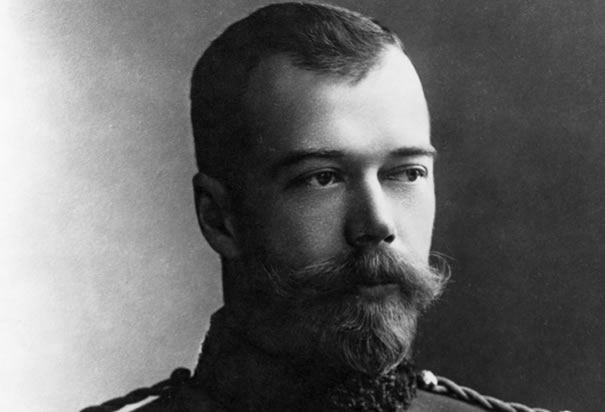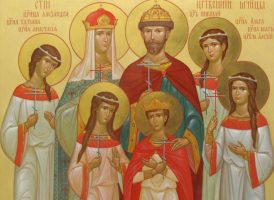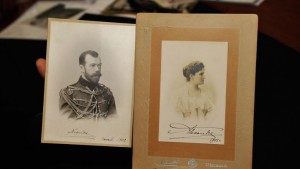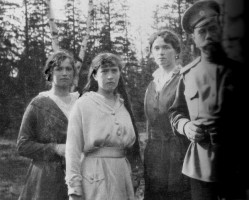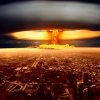The still free West is very far from real Christianity and the future of the world may well be determined by what will happen in Russia…If Russia succumbs, the world may well be lost, but if Russia emerges renewed and spiritually strengthened from the red cocoon, then the world may be saved.
The Struggle for World Power, George Knupffer, London 1958
Introduction
‘A weak, stupid, incompetent reactionary, who blocked progress towards a Western-style constitutional monarchy or republic. Such is the primitive Western stereotype of the much-slandered and later martyred Tsar Nicholas II, whose only real fault was probably that he was too kind. In actual fact, the above widely-repeated stereotype says very little about him, but far more about the hateful xenophobia and arrogant, hypocritical and self-justifying prejudices of those who hold it.
What they are saying in reality is that the innocent Tsar, who opposed their Western materialist ‘progress’, had to be destroyed, however embarrassing to them the barbaric manner of his and his family’s deaths. The remarkable thing is that this anti-Russian Western historiography coincides perfectly with both Soviet and pre-Revolutionary anti-Orthodox historiography. Why? Simply because its writers have the same sources – in the same anti-Christian, materialist ideology which developed in the West and which the West has spread worldwide. What are some of these myths?
Serfdom
Serfdom was not Russian – it was introduced from the West together with absolutism, i.e. tyrannical monarchism. Serfdom was gradually introduced into Russia by Western rulers or rulers with a Western mentality, notably the Emperor Peter I and the German Empress Catherine II. It lasted only some 200 years and was abolished peacefully before the USA abolished its system of slavery – only in the USA it took a dreadful war and half a million dead before slavery there could be abolished. As regards Western Europe, it should be added in the nineteenth century the condition of its agricultural workers and toiling industrial masses was little better than slavery.
Tsar Nicholas II
Tsar Nicholas spoke five languages fluently, had travelled the world and was very well-acquainted with European history. To call him stupid or intellectually limited is absurd. True, he was not an ‘intellectual’ – but then has any intellectual ever made a great ruler? If he had been weak, he would have fallen to the stress of being Tsar long before the First World War. If he had been weak, he would never have taken over the command of his Armed Forces from the incompetent in August 1915. He was not incompetent – though many of the generals, ministers, aristocrats and bureaucrats around him, including his Romanov cousins, certainly were incompetent – as well as being futile idlers.
One of the Tsar’s greatest problems here was finding disinterested, trustworthy and competent administrators. It was precisely the treachery of untrustworthy and incompetent careerists that brought about the Tsar’s so-called abdication. To call the Tsar reactionary is also absurd. For instance, it was he who, against all the advice, appointed the brilliant liberal Petr Stolypin as his Prime Minister. He taxed the rich and gave to the poor, turning peasants into landowners – much to the irritation of certain Romanov family members and other over-wealthy aristocrats, who then plotted against the Tsar. The tragedy was that Stolypin was assassinated by a terrorist after only five years at the helm and before his reforms had obtained all the results required.
 Tsarina Alexandra
Tsarina Alexandra
The Tsarina was not hysterical, immoral or pro-German. She identified fully with Orthodox Russia; her alienation from decadent St Petersburg society was precisely because she was moral. And having seen her kingdom of Hesse destroyed by Prussianism, she only had dislike for the Prussian (‘German’) militarism that lay behind the Kaiser’s War. The Tsarina did not interfere in the administration. Her role is clear from her correspondence with the Tsar. She supported and, during the War, took on some secondary tasks such as sending letters of thanks, under her husband’s instructions. She certainly suffered greatly with anguish at her son’s condition, but as for hysterical, how could she have been, when she chose to wash and dress the wounds of soldiers day in, day out for two years?
Khodynka
The quite unforeseen stampede of people at Khodynka Field after the Tsar’s coronation in 1896, in which many hundreds died can hardly be blamed on the Tsar. Like recent stampedes in Western countries, it was a dreadful accident, causing the death of hundreds in a then unprecedented crowd of 500,000. The compassionate Tsar gave the families of those who had suffered large sums of his own money in compensation.
Pogroms
By far the worst anti-Jewish riots (‘pogroms’) at the turn of the century took place not in the Russian Empire, but in Berlin, Vienna and elsewhere in Western Europe. (Who has forgotten Dreyfus?). In Russia these riots were strongly discouraged and involved small numbers in Poland, Bessarabia and the western Ukraine. The Tsar’s government did its utmost to defend the Jews of his Empire, who had moved there, seeking protection from persecution in Western Europe. Thus, the Jews were kept away from large areas of Russia for their own protection from peasants, who felt exploited and aggrieved by the successful commercial genius of the Jews. As we all know, it was not Russians who killed millions of Jews in the 1940s, but Western Europeans – and, it should be said, not only Germans.
The Russo-Japanese War
A belligerent, impatient and imperialistic Japan attacked Russia without warning at Port Arthur in 1905, just as it attacked the USA without warning at Pearl Harbour in 1941. Russian unpreparedness came in part because it had spent so little on its armed forces – unlike the aggressive Western nations and their imitator – Japan. It was Tsar Nicholas who had proposed international disarmament at the Hague. To accuse this peacemaker of starting the war to create national unity is simply a myth of those who know no history. With only about a quarter of Western European and Japanese military spending, a peace-directed Russia was ill-equipped to fight a war thousands of miles from its capital. To blame the Tsar for Japanese aggression or the disastrous inefficiency of individuals in his administration before and during that war is hardly just.
Bloody Sunday
In the absence of the Tsar from St Petersburg (because of the almost successful assassination attempt on him and his family three weeks before), a violent mob (and not ‘peaceful and unarmed’, as the Western propaganda goes), burning and looting vehicles and other property revolted on Bloody Sunday in 1905. It was led by a renegade, twice-married priest, Fr George Gapon, who hanged himself the next year, when it was discovered that he was in fact a secret agent. In order to defend the fearful citizens of St Petersburg, troops opened fire and tragically killed 92 (not ‘thousands’, as the Western propaganda goes) of the mob. The soldiers had to open fire in defence of the people of St Petersburg, who had barricaded themselves inside their homes from terror. The tragedy was that people died.
Backward
Russia was not as backward as the Western media make out. In many respects much of Western Europe and the USA were far more backward. In 20 years under Tsar Nicholas II the population of his realm increased from 123 million to 175 million. By 1913 the speed of industrial development in Russia had outstripped that of the USA. By 1913 its grain production had outstripped that of the USA, Canada and Argentina combined by one third. The Russian Empire had become the granary of Europe; its grain production increased by 70% between 1894 and 1914. Between 1894 and 1913 its industrial production quadrupled. In 1914 the French economist Edmond Théry predicted that by 1950 Russia would dominate Europe politically, economically and financially.
Social Insurance was introduced in 1912, and there was a factory inspectorate, but laws banning certain forms of exploitation had been passed for the first time in the world as early as the eighteenth century, including introducing a maximum ten-hour day. 80% of the arable land was in the hands of the peasants by 1914, the Tsar himself freely giving up 40 million hectares of land in Siberia. So many tens of thousands of schools were opened that by 1917 the level of literacy stood at 85% – comparable to that in the USA today. The Tsar’s Russia was not destroyed because it was ‘backward’, but because it was the last bulwark of Christianity and the materialist enemies of the Gospel, Capitalist or Communist, could not tolerate that.
World War I
The aim of the Western Allies was not only to defeat Germany. It was also to weaken and divide Russia. The West knew that with thirty more years of peace, Russia would become the most prosperous nation in the world, as its Prime Minister of Agriculture, Krivoshein, had publicly said in 1912. The West would not allow this. Neither could the West allow Constantinople and possibly Antioch and Jerusalem to become Russian Orthodox Protectorates, as the Tsar wished, as a result of the imminent Russian victory in the Kaiser’s War.
Thus, as soon as the Western-organised Revolution had taken place in early 1917, the USA entered the War and the American century began. By 1945 all of Western Europe had become the USA’s puppets. This was no coincidence. The Tsar’s loyalty to the Allies forbade him from making any separate peace; sadly, his loyalty and sacrifices for the Allied cause was met by the Allies’ disloyalty to him and his realm. What was remarkable about the outcome of the War was the treachery of the West. At the Tsar’s so-called ‘abdication’, Lloyd George actually said in Parliament that through it ‘Britain has achieved one of its major war aims’!
After the coup d’état of the Bolsheviks, who seized power from the incompetent aristocrats and bourgeoisie who had carried out the Revolution, the British landed in the far north and at Baku in the far south of the Russian Empire, giving independence to Azerbaijan, as they were greedy for its oil. The Italians marched into Georgia and created an independent state there, as they were greedy for its manganese. The French occupied Odessa and intrigued for the independence of the Ukraine. Instead of equipping the Whites, the West gave its arms to the Poles, who then invaded and occupied Kiev and Smolensk. Then the Americans and the Japanese landed in Vladivostok. The renegade General Brusilov who had passed from White to Red and remarked that, ‘The Poles are besieging Russian fortresses with the help of the nations whom we rescued from certain defeat at the beginning of the War’. He was a traitor to the Tsar, but here he spoke the truth.
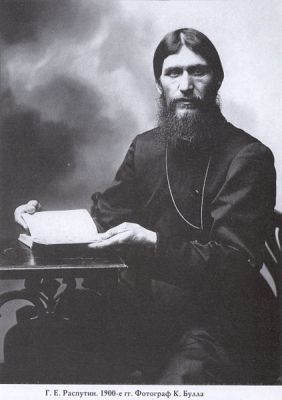 Rasputin
Rasputin
Recent Russian (= Non-Soviet) scholarship has proved that Gregory Rasputin was the object of the most awful slander and gossip. Why? Because the slanderers wanted to justify their hatred for the Monarchy through the Rasputin legend. Research by authors like A.N. Bokhanov has taken place in the archives, not in gossip and pornographic forgeries. Rasputin was purposely misrepresented in a Russia without censorship (unlike Western Europe), but also without laws against defamation. He had to be demonised by those who hated him because he was a real Christian. Russia did not fall because of Rasputin, but because of those who slandered rasputin and the government of the Tsar with him. Absurdly accusing Rasputin of virtually running the country during the War, the fantasy which they projected, most of these slanders came from degenerate aristocrats or wealthy, power-hungry bourgeois.
Rasputin had no political influence on the independently-minded Tsar; he lived in Siberia until 1914 and visited the Imperial Family only when the Tsarevich was ill. ‘Rasputin’ does not mean ‘debauched’, it means he who lives where there are no roads. He was not mad, or a mystic, or a heretic, or a horse-thief, or a monk; he was a pious married layman with three children. One daughter, Matrona, died in Los Angeles in 1977; a great grand-daughter is alive and well and lives in Paris. He was not a depraved drunkard who was very rich. True, he had peasant manners, but then he was a peasant. Money given to him by the rich, he generously gave to others and to his village church. He died, or rather was cruelly murdered, in poverty.
Rasputin was recommended by St John of Kronstadt and Bishop Theophan (Bystrov) for his sincerity. A devout Orthodox Christian, with a miraculous gift of healing, he spent much of his time in monasteries and at prayer. He was a pious peasant healer, sent by Providence to heal the Tsarevich, who performed miracles. Jealous and idle aristocrats tried to corrupt him with alcohol, and he was murdered by them. Among these aristocrats was the transvestite occultist Yusupov, and British secret agents. Yusupov, a great admirer of Oscar Wilde, was a cowardly homosexual who had shirked his military duties. He was not only a cold-blooded murder, but also a liar. Rasputin’s murder dismayed Russian peasants, of whom Rasputin had been one, for they felt that it meant that corrupt aristocrats would always stop any of them from getting close to the Tsar.
Conclusion
Russia was brought down by the 5% of population, its ‘intelligentsia’ who, even after murdering Rasputin, continued to slander the Royal Family most atrociously. Little wonder that those who managed to emigrate mostly quit the Russian Church as soon as possible, unable even to remain faithful to this; it was ‘treason, cowardice and deceit’, as the Tsar-Martyr had said. The Westernised aristocrats were anti-Russian. This is also why it took the free Russian Orthodox Church 63 years to canonise the Imperial Family – because there were too many laypeople, who were opposed to the canonisation and therefore to the righting of the historic injustices committed by their parents and grandparents. Only after that canonisation, in fact an act of repentance, had taken place, could the Soviet regime, ultimately brought to power by a degenerate aristocracy, fall.
As the senior US economist and political activist, Paul Craig Roberts, put it recently in his essay, ‘Does the West have a future?’: ‘If you believe in murdering your opponents, not debating with them, dispossessing the powerless, creating a fictional world based on lies and paying the corporate media to uphold the lies and fictional world, you are part of what the rest of the world perceives as ‘The West’…. People without valid information are helpless, and that is where Western peoples are. The new tyranny is arising in the West, not in Russia and China’.
Source: Orthodox England












